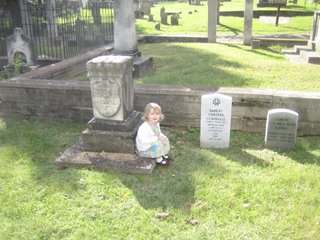Friday, October 06, 2006
Between sessions
I also had a moment to talk with Kevin Swanson, the executive director of the Christian Home Educators of Colorado, another excellent writer and speaker.
I need a minute more on my notes from Doug Phillips' presentation but those should be up shortly.
Alexander Strauch on Biblical Eldership
Surely His goodness and mercy here daily attend thee!
Ponder anew what the Almighty can do
if with His love He befriend thee!
We opened this morning with song and Scott Brown pointed out the verse above as especially meaningful in his own life. Certainly I concur. I haven't heard the official number yet but we're sitting in the Crystal Ballroom with about 400 people, not just the men of the church but a number of their wives and not a few children. I don't know if there is any program for the youngest present, though.
Alexander Strauch is speaking this morning. Scott Brown is introducing him and his book, Biblical Eldership. “This has become the seminal work on church leadership. It is a timeless book because it is a collection of expositions of Scripture, nothing fancy but the beautiful, sweet words of Scripture,” says Scott. He says this book has sold something more than 250,000 copies since publication in the 1980's; “It has been a wonderful correction in the life of the church,” he says.
Strauch recommends two books: Agape Leadership on the life of Robert Chapman, the spiritual mentor for George Mueller and the first trustee of Hudson Taylor's China Inland Mission. Spurgeon called him “the saintliest man” he knew. The second book was given to us at check-in, Leading with Love, Strauch's own.
The opening Scripture is Titus 1:5-10 on Paul's view of elders and church order.
The essential nature of having elders who are properly qualified. “[Paul] would say this is a problem in many churches today.”
Strauch said when he was a student at a Baptist seminary some decades ago, the professor lectured on church polity without referencing Scripture. When he asked why, Strauch said he was told all those passages in Paul were just “proof texting” and not relevant.
Many churches have people called “elders” but many are not Biblical elders. The Board Concept is common – elders are elected laymen and not expected to be qualified nor permanent leaders.
“Reformation, revitalization, and recovery of doctrine is an unending task for God's people” he says.
“In every generation, we need an enlightened purification of our tradition; the cry of the Reformation is semper reformanda. The church is always being reformed.” -- R.S. Lewis
John Robinson writing for the Separatists on their departure from Holland deplored Reformed churches who have not moved beyond their reformers – Lutherans who stopped growing with Luther, Calvinists who never go further than Calvin, and so on.
The churches established by the apostles are always examples for the modern church. Further, the New Testament teaches and models plurality of elders and pastoral eldership.
OT witnessed plurity of elders. “It is not a new and subversive doctrine invented by John McArthur twenty-five years ago.” There are elders around the very throne of God. It is the background to the NT
Jesus Christ established eldership for His church. He did not appoint a single man to head the church but appointed twelve and then trained them as a team. He singled out three for particular ministry and leadership; “[And] They were not twelve long-stemmed roses,” he says.
New Testament elders are more defined than their Old Testament counterparts. Further, there is more in the New Testament about elders than about the Lord's Supper, baptism, the Lord's Day, or spiritual gifts. The NT gives us Examples of elder-led churches, Instruction to churches about eldes, Instruction and exhortation directly to elders (Acts 20, 1 Peter 5), and the apostolic direction to elders to “set in order” and correct deficiencies in the church.
“Why do we have elders? Because the Bible says so.” A mission professor who was reprimanded for using Biblical Eldership in classes when it didn't include women in that role said, “It's not the author's fault; look at the title.”
Elders promote the true nature of the church. The structure of government you give the local church makes a profound statement about the body, and it is important. Why? Because the church is a close-knit family and household -- 1 Tim 3.15. The church is a humble, serving community. Luke 22.26f. Humility, servant hood, and love is modeled by shared leadership.
Mt 18.20 The church is under the headship of Christ. “This was very real to the early church.”
And it promotes the protection and accountability of leaders. “Our theology tells us man has been ruined by sin.” Jer 17.9 says the heart is desperately sick. “You need accountability and community.”
Defining and understanding New Testament Christian eldership
The general NT concept is pastoral oversight, not board eldership or lay eldership. They shepherd the church.
There is one very confusing subject in many churches ... equality and diversity within the eldership. It's taught in the four gospels even before the Epistles. The church is built on the apostolic body and authority selected by Christ. Not Peter and the associate apostles – all equally called to go out in Christ's name. But no question Christ also picked Peter to strengthen his brethren.
Look at 1 Tim 5 (Cf. Acts 20) – Paul charged the Ephesian elders to guard the church. The church's great enemy is false teachers. Five years later he returns to Ephesus and finds false teaching rampant, excommunicates two men (see 1 Tim 1) and leaves Timothy behind to take action, sending a letter of instruction and authorization to him later. The best remedy for false teaching is good teaching.
“Sermonettes produce Christianettes.”
Those who work hard, to the point of weariness, in preaching and teaching. Among the elders, not every is gifted as a teacher but every one must be able to teach. Some rule well, some are laborers, some are due double honor for their diligence in study and exhortation. The church must take care of them, not be jealous of them, because they will grow the church. All share the same charge but not all are similarly gifted. There is equality and diversity, the Biblical pattern from both Christ and Paul.
“What a beautiful system of government that allows all men who have desire and qualification to take part in the government with their particular giftedness being recognized.”
Uniting Church and Family
I'm going to take a shot at blogging through the day -- partly so others can benefit from what we're hearing, and partly because I'm lazy and don't want to go back afterwards and type up my notes later.
Voddie Baucham and Scott Brown have walked in, along with Jeff Pollard, so I'm going to go say hi before we get started.
But, Sir
"I turned the handle marked 'C' and got scalding hot water," he said.
"But, monsieur," said the clerk, "this is Montreal! To us, 'C' means chaud. It is French for 'hot'."
"I know that," said the guest, "but the other handle was marked 'C', too."
"Ah. But, monsieur," said the clerk, "you see, in Montreal, we are bilingual."
[Not original to me, but I was reminded of it in the shower this morning.]
Saturday, September 30, 2006
A visit to great-great-great-great-grandpa

It's not often you have the opportunity to visit the grave of your great-great-great-great-grandfather. In my North Carolina family, a lot of the graves were marked with uncut slabs of rock, if at all. From the small bit of information I've uncovered, this grave had even less marking other than the tradition that he was buried next to his four-month-old son Webb in the old Nashville City Cemetery, Nashville, Tennessee.
Susannah is sitting on the child's marker, and just to the right is the new (2005) headstone for Samuel Chester Godshall, Captain, Co. G, 11th Tennessee Infantry, the great grandfather of her great grandmother.
The smaller marker has the names of three Godshall children who died in the same year, 1860, presumably of some illness or disaster. What the marker doesn't show is one of the more interesting names to appear in the family tree -- "A.H." is Captain Godshall's wife, Aramathea Helon Webb (listed as Aramathea in the 1860 census and Helon in the 1880, when she was living with her bachelor brother John C. Webb and her widowed sister).
Friday, September 22, 2006
Okay, I know it's stupid
While working on a month-long project out of town (and, not incidentally, on an expense account), I took advantage of a small storefront Chinese restaurant a few blocks from the hotel.* Just for fun, I always make it a point to eat Chinese food with chopsticks, as it was intended, and try to ask for them in Mandarin (Duì bù qì -- gěi wo kuài zi?). I'll confess, I'm not much good with rice, so I'll cheat and use the fork for that.
Unfortunately, eating Chinese four or five times in two weeks wore a groove in the cultural processor in my brain. One evening, I ran across a Greek restaurant** and settled in for another exotic meal ... and all the time, my brain was saying, "Chopsticks ... need chopsticks ..."
Apparently it couldn't deal with "Greek" and settled for "foreign".
=====
* If you're interested, it's the Shuang Xi Kitchen in North Charleston, SC, just off Montague Avenue and near the airport ... it's good, too.
** This was the Zeus Grill and Seafood in Mount Pleasant; it is tucked in behind some crepe myrtles so it's hard to see from the highway, US 17, but it adjoins the parking lot for the Outback Steakhouse. It was really good, and I highly recommend the lemon chicken soup.
Saturday, September 16, 2006
Is it Gestalt? Or word association?
Tuesday, September 12, 2006
Never answered
Tuesday, August 22, 2006
Hotel Galeria
Monday, August 14, 2006
Back to the graphics shop, please
"Bubbles -n- Giggles Passport Photos While You Wait".
It comes from trying to use the extra square foot of the banner advertising a new baby picture setup. I'm not going to spend any time trying to picture exactly what a "Bubbles -n- Giggles Passport Photo" might look like.
Saturday, August 05, 2006
Just what is an inundated Calvinist?
Monday, July 10, 2006
Article in Carolina Journal Online
Wednesday, June 21, 2006
The thing itself
I did run across this item the other day and thought I might as well put it up. An article in The Tennessean described a debate on Calvinism during last week's annual meeting of the Southern Baptist Convention. I was struck by the Christian tone of both men who honestly wanted to discuss theology, not aim for personal destruction of their opponent. The most regrettable comment, though, came from a Tennessee pastor who will remain nameless:
"I don't get caught up in Calvinism or some of the other issues," said [Nameless], pastor of [Deleted] Baptist Church in [Deleted], Tenn., attending with his wife, [Mrs. Nameless]. "I think our denomination needs to just focus on evangelism, on reaching the world through Christ."
Interesting twist there, reaching the world through Christ, not for Him. What's the purpose here?
But what bothers me is the highlighted comment. Occasionally I hear statements along the lines of, "At our church, we don't care about doctrine, we just love Jesus" -- begging the question what to do about Acts 2:42, for example -- but I expect better reasoning from a pastor. And if Calvinism as defined in the current debate isn't about evangelism, then it's not a debate at all.
I'd have to agree -- Pastor Nameless apparently isn't involved in the issue.
Thursday, June 08, 2006
An Automotive Thought
This afternoon I'm dealing with the realization that for every hundred miles we drive in the van, we'll spend $24.45 on the gas, $1.35 on the tires, 42 cents on the oil, and three bucks on the air conditioner.
Anyway, that's about the cost of cool air in our eleven-year-old 15-passenger van, if our mechanic is right.
I'm reminding myself that as long as we're spending less than $400 a month on repairs, we're coming out ahead in the near term.
Monday, June 05, 2006
Worms, I Tell You
Some years ago I read several books on English and American hymnody. It was interesting reading, but it was plain that like so many other areas of American Christianity, there was a definite slide in the content of the hymnbooks during the last century. One writer quoted, humorously he thought, a clergyman colleague's complaint about "vermicular hymns", that is, "hymns with worms in 'em!" We sang one this past Sunday -- in the sanitized version, alas, but remembering Isaac Watts' original --
Alas! And did my Saviour bleed?
And did my Sovereign die?
Would He devote that sacred head
For such a worm as I?
More modern hymnbooks pull the "worm" reference and substitute "sinner", which it still Biblical and no doubt still offends some. Still worse, though, is the bouncing chorus that some cheerful soul added long after Watts reached his reward:
At the cross, at the cross, where I first saw the light
And the burden of my heart rolled away (rolled away)
It was there by faith I received my sight
And now I am happy all the day
It's a catchy chorus, though you could debate whether modern notions of "happy" still mesh with the synonym "blessed" when the chorus was added. It even has good harmony and an interesting bass line, I'll admit, but it's totally inappropriate for the original hymn. Watts concludes his portion with simple pathos:
… dissolve my heart in thankfulness,
and melt mine eyes in tears.
But drops of grief can ne'er repay
The debt of love I owe
Here, Lord, I give myself away
'Tis all that I can do
Look at Watts' vocabulary --
Alas, grieve, bleed, die, worm …
dissolve, melt, tears …
drops of grief, debt, owe, and give myself away.
And the chorus responds:
And now I am happy all the day
I tried singing "blessed" but it just wouldn't fly.
Keep the chorus, if you like, attach to another hymn or develop the idea to stand in its own framework. But as for me, I need to be reminded of my vermicular state, and my helpless dependence on a gracious Savior, and the awful price He paid, daily. Or to borrow the chorus, all the day.
Sunday, May 28, 2006
Conference report
Someone stopped me in the hallway at the conference and asked how I was doing. I told them I was hot, footsore, and full of headache, and wouldn't be anywhere else in the world. All true.
The big personal event was completing my three terms as president of the organization and handing the reins over to my extremely capable "executive officer", Ernie Hodges of Pfafftown. Ernie has been my wing man for the entire three years and I couldn't have asked for one better. I recently read Leading from the Second Chair, a book about how associate pastors, vice presidents, and assistant chairmen can improve their service in the "second chair" positions, and I was thinking the entire time, "Ernie already does this." I'm looking forward to serving under his administration now, and thank him for the support he's given me.
I also had the privilege of speaking to the Friday morning general session, about two thousand homeschoolers in one place, on "the state of homeschooling". The point I wanted to get across is that home education in North Carolina, like Franklin's summation of the Constitution, is a freedom we enjoy only as long as we are careful to keep it. Homeschooling has grown to a population comparable to the city of Fayetteville, and I doubt that we will see a true assault on the basic right to teach our own children at home. What concerns me is the rise of public school programs which offer a home-based instructional program. The educational libertarian in me applauds the development of any alternative system which will allow parents to spend more time and attention on their children's education, saving taxpayers money on school construction and personnel costs to boot; yet we homeschoolers have to remember that a public school program in our living room is not an expression of the parents' right to direct the education of their children.
If our only concern is negative socialization, then keeping our children off the bus and the playground by using a virtual school program may be an adequate solution. If our intent is to train up our children according to our own conscience and best judgment, though, we can't forget that accepting the convenience of public school at home means trading away our independence and freedom to do what we think is right, regardless of the state's largest bureaucracy.





